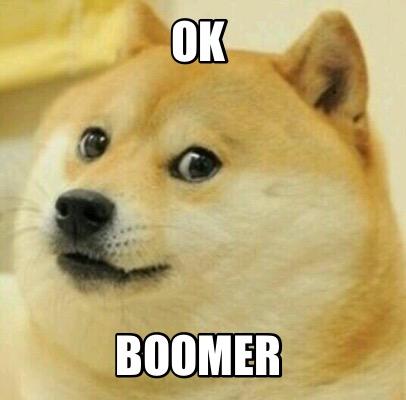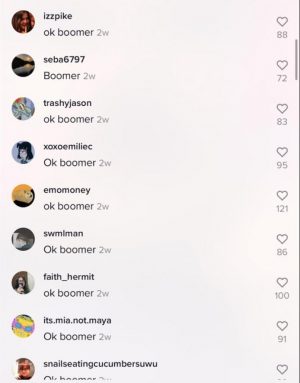“Ok Boomer”: ageist attack or a Millennial’s defense?

November 23, 2019
If you spend any time online or on social media, you have probably come across the phrase, “OK Boomer.”
The phrase has circulated as a meme, been the focus of articles written by authors of a certain age about how the term “Boomer” should be considered a slur, and has featured prominently in the replies of people who make a bad or seemingly antiquated comment.
The “Ok Boomer” meme has become vogue, but these two words have also been the source of controversy.
On the surface, the phrase seems to be a tongue-in-cheek way to reply to an old or out-of-touch person, but what it really reveals is the struggle between generations that has existed since the beginning of time.
Many people who spend a lot of time online are familiar with the trope of older people and journalists writing articles like, “How Millennials Killed Mayonnaise,” or “Stop Buying Avocado Toast If You Want To Buy A Home.” Yes, these are both real articles, and both offer general criticism of Millennials and Gen Z, suggesting they are “snowflakes,” or “weak.”
“Ok Boomer” is weaponized irony aimed against the Baby-Boomer generation, who, as a whole, are perceived by the younger generation as more traditional and conservative, while the younger generation as a whole sees itself as more progressive.
This contrast can be seen in the support of candidates like Democratic Presidential candidate Bernie Sanders holding the majority of voters who are between 18-29 years old, while someone like former Vice President Joe Biden, a centrist, holds greater support amongst those 55 and up.
The question is, what is causing this animosity between generations? And is the phrase a positive or negative thing?
Like most things, the issue can be traced back to money. According to Bruce Gibney, author of A Generation of Sociopaths: How the Baby Boomers Betrayed America, the Baby Boomer generation had it much easier than their parents, and on the whole did not know what it was like to live without.
In an interview with Vox, Gibney said, “They [Baby Boomers] were raised after the war and so have no real experience of trauma or the Great Depression or even any deprivation at all. More importantly, they never experienced the social solidarity that unfolded during war time and that helped produce the New Deal.”
Growing up in these prosperous post-war conditions altered the views of this generation. The disparity between the two generations might be comparable to the way that people with a great amount of wealth have a warped perception of middle- and lower-class people, or the way some white people have difficulty understanding the concept of racial privilege.
On the other hand, many Millennials have grown up in the wake of the greatest recession since the Great Depression, and to this day feel the repercussions. Because of this economic anxiety, many Millennials and Gen Z-ers are in support of an overhaul of the system that has done nothing but exploit them.
Boomers lived during a time where the country was thriving, and by proxy they idolize the system that made them wealthy. Another reason this poor versus rich disparity exists is because not many of the poor members of the Boomer generation survived. The AIDS crisis, multiple wars, and generally poor healthcare provided to the lower classes each took their toll on the generation, so that only the richer Boomers survived into older age.
As a result of their wealth and easy upbringing, Boomers are more out-of-touch with the issues of the hoi polloi.
They perceive younger people as complaining for no reason, because if they can make it, anyone can.
All the hot takes from media types have vilified this phrase as ageist and perceive it as sullying the relationships between the generations, when it is merely just a response to the countless articles calling Millennials weak and lazy.
This weaponization of memes is nothing new, or even the most recent example, as the “Jeffrey Epstein Didn’t Kill Himself” meme demonstrates. But identifying the context out of which a meme like “OK Boomer” emerges is important because speaking truth to power and addressing those who exert power over you is essential to keeping these powers in check.


